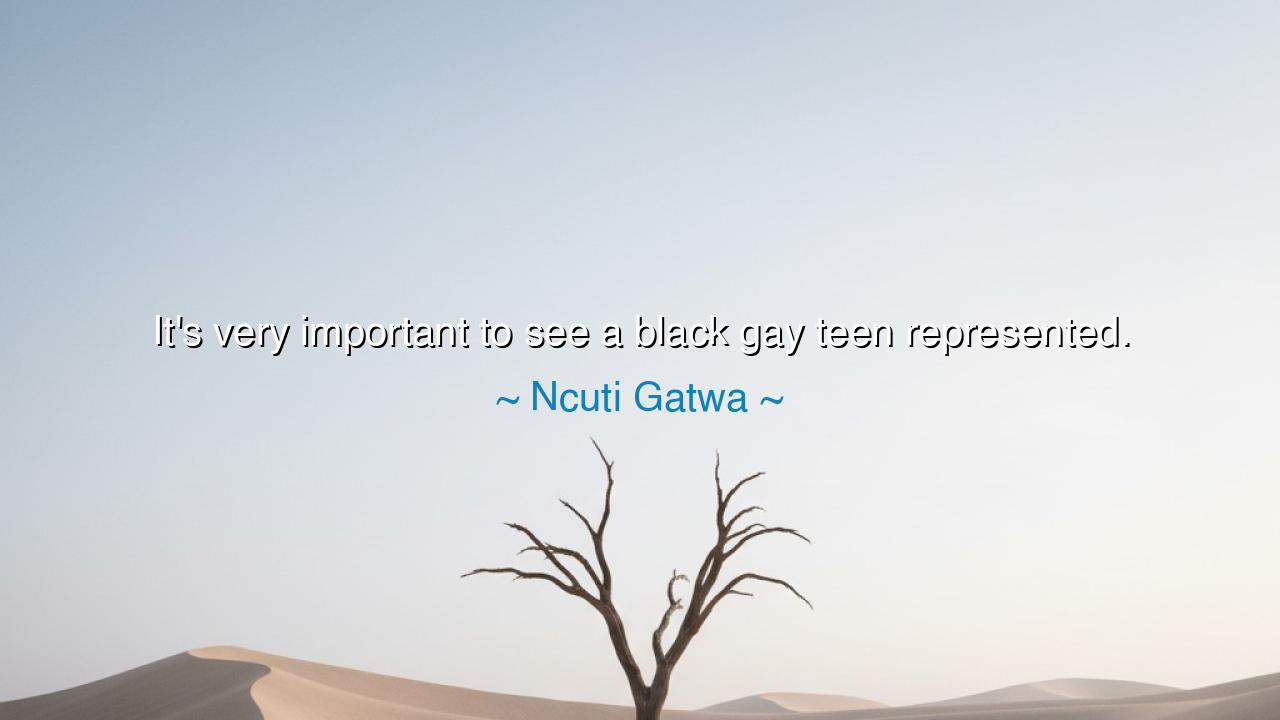
It's very important to see a black gay teen represented.






Hearken, O children of the ages, to the wise words of Ncuti Gatwa, who speaks with clarity and compassion: “It’s very important to see a black gay teen represented.” In this declaration, we discern an eternal truth: the mirror of society, reflected in stories, art, and culture, shapes identity, self-worth, and possibility. To see oneself acknowledged, celebrated, and understood is to claim space in a world that too often denies it, and to inspire courage, confidence, and vision in those who walk paths that have long been invisible.
Since the earliest days of human storytelling, representation has been the vessel through which communities and individuals recognized themselves and their place in the world. In ancient myths and epics, heroes embodied virtues, struggles, and identities that guided the young, teaching them both aspiration and empathy. Gatwa’s reflection echoes this principle: to witness characters who share your identity is to perceive that your life, experiences, and feelings are not anomalous, but part of the enduring fabric of humanity.
Consider the story of James Baldwin, who, as a young Black gay man in mid-20th century America, often found few mirrors in literature or society. His work—novels, essays, and speeches—became the reflection for countless youth who saw in his words a validation of their feelings, struggles, and humanity. Gatwa’s insistence on representation continues this legacy: visibility is not merely symbolic, it is empowering, offering guidance, hope, and the courage to exist authentically.
Gatwa’s insight also illuminates the interplay of identity and belonging. Adolescence is a season of profound vulnerability, where the young seek both self-understanding and social acceptance. To witness a character who shares the intersection of racial, sexual, and social identity is to gain affirmation, to feel seen, and to realize that one’s narrative is valid and worthy of attention. Ancient educators recognized the power of exemplar and mirror: stories and characters guide the mind and spirit, instilling courage and moral imagination.
The lesson is profound: representation matters because it shapes perception, nurtures empathy, and fosters resilience. When youth see themselves authentically portrayed, they internalize the knowledge that their lives, struggles, and joys are recognized. Society, too, benefits, for visibility cultivates understanding, reduces prejudice, and inspires allies. Gatwa reminds us that to erase or ignore identities is to diminish both individual potential and collective moral vision.
Practical guidance flows from this wisdom. Support media, literature, and art that amplify marginalized voices. Encourage young people to seek stories and narratives in which they see themselves authentically represented. Engage with works that broaden empathy, acknowledging the importance of intersectionality and the diversity of lived experience. In doing so, society cultivates both justice and imagination.
Gatwa’s words also remind elders, creators, and educators of their responsibility: to craft narratives that validate, honor, and inspire. The absence of representation is not neutral; it shapes the psyche, limiting vision, confidence, and hope. By ensuring that Black gay teens, and all marginalized youth, are visible, storytellers and mentors cultivate courage, resilience, and the ability to navigate a world that may otherwise feel unwelcoming.
Thus, heed the eternal teaching of Ncuti Gatwa: the sight of a Black gay teen represented is both a mirror and a beacon. It illuminates possibility, nurtures identity, and fosters courage to live authentically. In honoring representation, we honor humanity itself, guiding youth toward self-understanding, empathy, and the vision to claim their place in the world with dignity and pride.






AAdministratorAdministrator
Welcome, honored guests. Please leave a comment, we will respond soon